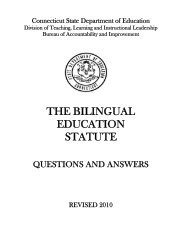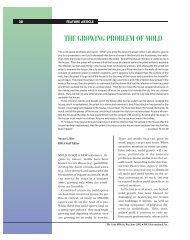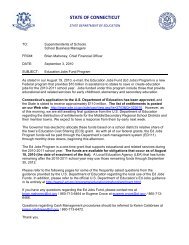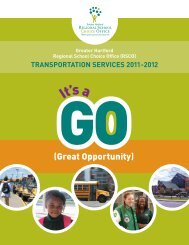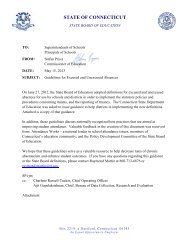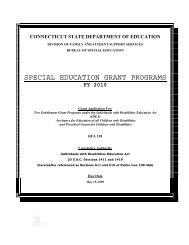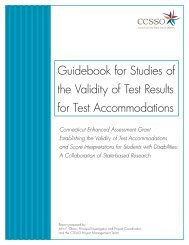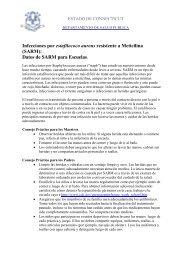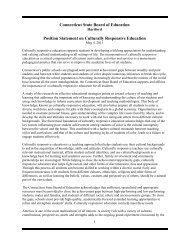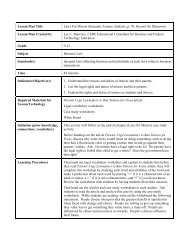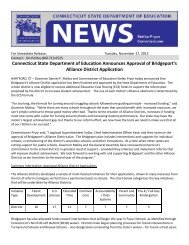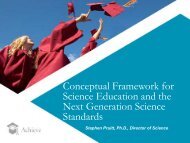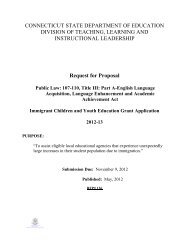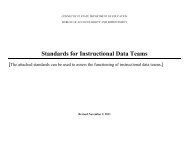Early Childhood - Connecticut State Department of Education
Early Childhood - Connecticut State Department of Education
Early Childhood - Connecticut State Department of Education
Create successful ePaper yourself
Turn your PDF publications into a flip-book with our unique Google optimized e-Paper software.
Assessment Chapter 4<br />
SOCIAL-EMOTIONAL<br />
• How does the child approach others? Did the<br />
teacher initiate interaction?<br />
• Was the child friendly, bold, demanding? Did he<br />
or she touch or push?<br />
• What does the child say? How does the other<br />
child respond?<br />
• Is the child able to make his or her wishes known,<br />
understood?<br />
• How does the child react to the behavior <strong>of</strong> others<br />
(withdraws, enters play, defies)?<br />
• How does he or she behave with other children?<br />
• How does she or he handle conflicts? Is he or she<br />
able to wait her or his turn?<br />
• What are the child’s feelings about other children?<br />
• Are there any special problems or trends<br />
(impatience, hitting, temper outbursts, lack <strong>of</strong><br />
speech, excessive dependence on teacher)?<br />
• Where does the child fit in relation to the entire<br />
group (leader, follower, disrupter)?<br />
• Is the child chosen by others?<br />
MATHEMATICAL/ SCIENTIFIC REASONING<br />
• Can the child make generalizations from<br />
examining and using specific materials?<br />
• Does the child rely on the use <strong>of</strong> concrete objects<br />
or experiences to understand ideas?<br />
• How accurate is the child’s understanding when<br />
objects are absent?<br />
• Can the child be logical?<br />
• Does the child see part-to-whole relationships?<br />
One-to-one correspondence?<br />
• Does the child see sequence?<br />
• Can the child group objects using at least one<br />
criterion?<br />
• Does the child have an ability to see cause and<br />
effect?<br />
• Does the child know the usual daily schedule?<br />
REFLECTIVE QUESTIONS<br />
64<br />
LITERACY/LANGUAGE<br />
• Does the child use language for social purposes?<br />
• Is the child’s language directed more to adults or<br />
to children? Is the child able to communicate well<br />
enough to get through the day?<br />
• What are the child’s responses to stories read by the<br />
teacher?<br />
• Is the child able to rhyme?<br />
• Does the child speak in words, phrases, sentences?<br />
• Does the child show knowledge <strong>of</strong> the irregularities<br />
and tenses in language?<br />
• Does the child use pronouns appropriately?<br />
• Does the child choose books as an activity during<br />
the day?<br />
• How does the child use books? Does he or she<br />
show an understanding <strong>of</strong> cover, title, how to turn<br />
pages?<br />
• Is the child able to retell stories that have been<br />
frequently read in class?<br />
• Does the child use symbols to communicate<br />
thoughts and ideas?<br />
BEHAVIORS/DISPOSITIONS<br />
• When activities are teacher-initiated, how does the<br />
child react?<br />
• If the activity is child-directed, how does the child<br />
react?<br />
• Does the child seem to want to function<br />
independently?<br />
• How much individual attention is requested?<br />
• How does the child handle transitions, routines?<br />
(Continued on page 65)



